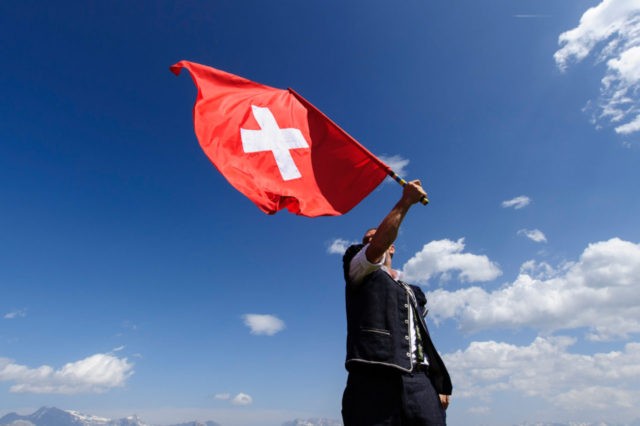Resentment toward the EU hit a new high yesterday when the upper house of the Swiss parliament on Wednesday followed in the footsteps of Iceland, and voted to invalidate its 1992 application to join the European Union, backing an earlier decision by the lower house. The vote comes just a week before Britain decides whether to leave the EU in a referendum. Twenty-seven members of the upper house, the Council of States, voted to cancel Switzerland’s longstanding EU application, versus just 13 senators against. Two abstained the Neue Zürcher Zeitung reported. Thomas Minder, counsellor for the state of Schaffhausen and an active promoter of the concept of “Swissness,” said he was eager to “close the topic fast and painlessly” as only “a few lunatics” may want to join the EU now, he told the newspaper. In the aftermath of the vote, Switzerland would give formal notice to the EU to consider its application withdrawn, the country’s foreign minister, Didier Burkhalter, was quoted as saying by Neue Zürcher Zeitung. The original motion was introduced by the conservative Swiss People’s Party MP, Lukas Reimann. It had already received overwhelming support from legislators in the lower house of parliament in March, with 126 National Council deputies voting in favor, and 46 against.
Topics:
Tyler Durden considers the following as important: European Union, Featured, Iceland, newsletter, Newspaper, Switzerland
This could be interesting, too:
Nachrichten Ticker - www.finanzen.ch writes Die Performance der Kryptowährungen in KW 9: Das hat sich bei Bitcoin, Ether & Co. getan
Nachrichten Ticker - www.finanzen.ch writes Wer verbirgt sich hinter der Ethereum-Technologie?
Martin Hartmann writes Eine Analyse nach den Lehren von Milton Friedman
Marc Chandler writes March 2025 Monthly
 Resentment toward the EU hit a new high yesterday when the upper house of the Swiss parliament on Wednesday followed in the footsteps of Iceland, and voted to invalidate its 1992 application to join the European Union, backing an earlier decision by the lower house. The vote comes just a week before Britain decides whether to leave the EU in a referendum. Twenty-seven members of the upper house, the Council of States, voted to cancel Switzerland’s longstanding EU application, versus just 13 senators against. Two abstained the Neue Zürcher Zeitung reported.
Resentment toward the EU hit a new high yesterday when the upper house of the Swiss parliament on Wednesday followed in the footsteps of Iceland, and voted to invalidate its 1992 application to join the European Union, backing an earlier decision by the lower house. The vote comes just a week before Britain decides whether to leave the EU in a referendum. Twenty-seven members of the upper house, the Council of States, voted to cancel Switzerland’s longstanding EU application, versus just 13 senators against. Two abstained the Neue Zürcher Zeitung reported.
Thomas Minder, counsellor for the state of Schaffhausen and an active promoter of the concept of “Swissness,” said he was eager to “close the topic fast and painlessly” as only “a few lunatics” may want to join the EU now, he told the newspaper.
In the aftermath of the vote, Switzerland would give formal notice to the EU to consider its application withdrawn, the country’s foreign minister, Didier Burkhalter, was quoted as saying by Neue Zürcher Zeitung. The original motion was introduced by the conservative Swiss People’s Party MP, Lukas Reimann. It had already received overwhelming support from legislators in the lower house of parliament in March, with 126 National Council deputies voting in favor, and 46 against.
Hannes Germann, also representing Schaffhausen, highlighted the symbolic importance of the vote, comparing it to Iceland’s decision to drop its membership bid in 2015. “Iceland had the courage and withdrew the application for membership, so no volcano erupted,” he said, jokingly.
Damian Mueller of the Free Democratic Party said it was necessary “to make a clean sweep”.
Others argued that it was a pointless discussion as the EU no longer considers Switzerland a candidate country. Filippo Lombardi of the Christian Democratic People’s Party said that it was “not very clever to discuss it once again,” calling the debate about Switzerland’s accession at this stage “a bit ridiculous”.
To be sure, Switzerland’s longstanding application to join the EU has not had a significant impact on the country’s politics for more than 20 years, as its accession negotiations have been suspended since 1992 in the wake of a referendum to join the European Economic Area, when the Swiss voted down the idea of closer ties with the EU.
Coming one week before the Brexit referendum it will be seen as highly symbolic, however, and may give further impetus to the Leave campaign.
Cited by the Spectator, Christoph Blocher, the Swiss former MP who led the charge to keep Switzerland out of the EU in 1992, said that Project Fear was deployed in that referendum, too. One politician predicted at the time that if it didn’t join, within five years it would be begging to do so “on its knees”.
In fact, those predictions never came to pass. “The Monday after the Sunday, the Bourse rose,” Mr. Blocher recalls.
But he agrees that Britain wouldn’t get the same deal as the Swiss post-Brexit: “No, you’d get a much better deal.”
His conclusion: “I think if you [Britain] leave the EU it will be very good for you.”
